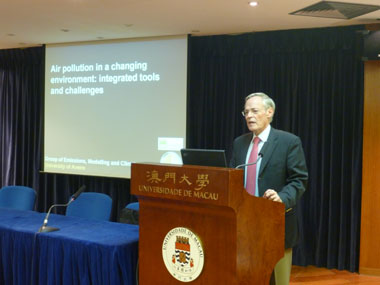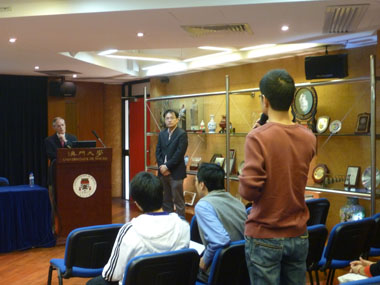A seminar entitled “Air pollution in a changing environment: integrated tools and challenges” organized by the Department of Civil and Environmental Engineering of Faculty of Science and Technology, took place at UM on 4th November 2010.
The seminar was delivered by Prof. Carlos Borrego, PhD in Air Pollution Modelling in 1981 at Free University of Brussels and Full Professor of Environmental Engineering at the University of Aveiro. During more than 30 years working on environmental problems, he is serving Portugal on a number of international scientific boards and committees (EC, NATO, ESF, etc.). He was Minister of Environment (1991 to 1994), Vice-Rector of the University of Aveiro and presently is the President of the Department of Environment and Planning. He is also Director of the European Association for the Science of Air Pollution – EURASAP. Since 1982, coordinating the Research Group on Emissions, Modelling and Climate Change, he was involved in more than 26 European projects. His research work includes over 400 scientific publications (163 peer-reviewed and participation in 16 books) on environmental impact assessment, air quality numerical modelling and management, development of emissions databases, wind tunnel simulation of flow and dispersion, numerical modelling of flow and dispersion around buildings. As Director of the Institute for Environment and Development – IDAD, the interface unit of University of Aveiro for cooperation with the Society, develops professional consulting and project activities.
The seminar started with the enactment of air pollution on all geographical and temporal scales, ranging from urban problems related to immediate and long-term effects on human health and material damage, over local, regional and global phenomena. Numerical air quality modelling is a powerful tool for air quality evaluation and management, and has been used to study the repercussions of emission reduction scenarios in air quality levels, and their impacts on human health and vegetation.
Since urban cities are the heart of most of the human activities, the major consumers of natural resources, and the major producers of pollution, it is obvious that the sustainability debate has an urban focus. Urban sprawl is altering the landscape, with current trends pointing to further changes in land use that will, in turn, lead to changes in emissions and air quality. Two case studies were addressed in the seminar. In the first one, the impacts of alternative urban growth patterns on air quality are analyzed through a 1-year application of a modelling system to Porto urban region (Portugal). Two land use scenarios for Porto urban area were defined (SPRAWL and COMPACT), and three full-year simulations were performed. Results revealed that SPRAWL resulted in an average temperature increase of 0.4°C, an aggravation of PM10 annual averages and an increase exceeding to the daily limit value. Finally, population exposure to pollutants is higher for COMPACT because more inhabitants are found in areas of higher concentrations.
In the second case study, the impact of road traffic management on urban air quality at the street level was assessed through the application of a Computational Fluid Dynamics (CFD) model. Different traffic scenarios were analyzed based on the modification of the number and location of traffic lanes for typical meteorological boundary conditions. Simulations for the different scenarios have shown distinct behaviors of the air pollutants due to the prevailing wind direction and roads positioning. It was concluded that, for typical conditions, the closure of the two traffic lanes located in the south side of the main Avenue and the two adjacent streets is the best solution for air quality improvement. This scenario leads to a 31% reduction on CO and PM10 concentrations in the North sidewalk and 81% in the South sidewalk when comparing to present conditions.
This conclusion stresses the importance of integrating the knowledge provided by the application of air quality models in urban planning and road traffic management with the goal of promoting the urban sustainability. The participants of this seminar were over 50, including students and teachers from FST.
 |
 |
|
Speaker Prof. Carlos Borrego, Full Professor of Department of Environmental & Planning, Former Vice-Rector of the University of Aveiro |
Students actively participate and ask questions during the seminar |

